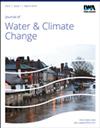The burden of water insecurity: a review of the challenges to water resource management and connected health risks associated with water stress in small island developing states
IF 3.1
4区 环境科学与生态学
Q2 WATER RESOURCES
引用次数: 0
Abstract
Abstract Water resources, whether exceeding per capita water abundance thresholds or below water scarcity thresholds, are health determinants within small island developing states (SIDS). Thresholds indicate water stress vulnerability in SIDS, however, underestimate the physicality associated with a lack of water. The objectives of this study are to capture the main challenges of consistently meeting water demand in SIDS and to present their intersection with certain diseases or factors associated with specific health conditions like dengue fever, gastrointestinal disorders, dehydration, and malnutrition. This review utilizes archival evidence to categorize the challenges undermining water availability in SIDS with the view that these issues present or exacerbate health outcomes. Seasonal rainfall variations (73%), inadequate distribution infrastructure (64%), saltwater intrusion (61%), contamination (58%), human-induced watershed change (19%), and sea level rise (17%) were identified from 108 country-specific sources as challenges to consistently meeting water demand by 59 SIDS. Any water stress indicator must consider that it is contingent on its human burden. These challenges affect food security through agricultural drought and soil salinization, and the proliferation of vector-borne and sanitation-related diseases across SIDS. This review is the first step in determining the human health burden of water insecurity in SIDS.水不安全的负担:审查小岛屿发展中国家水资源管理面临的挑战以及与水压力有关的相关健康风险
水资源,无论是超过人均水丰度阈值还是低于人均水稀缺阈值,都是小岛屿发展中国家(SIDS)的健康决定因素。然而,阈值表明小岛屿发展中国家的水压力脆弱性低估了与缺水有关的物质问题。本研究的目标是抓住持续满足小岛屿发展中国家水需求的主要挑战,并提出这些挑战与某些疾病或与登革热、胃肠道紊乱、脱水和营养不良等特定健康状况相关的因素的交集。本综述利用档案证据对小岛屿发展中国家破坏水供应的挑战进行分类,认为这些问题呈现或加剧了健康结果。季节性降雨变化(73%)、分配基础设施不足(64%)、盐水入侵(61%)、污染(58%)、人为引起的流域变化(19%)和海平面上升(17%)是59个小岛屿发展中国家持续满足水需求的挑战。任何水资源压力指标都必须考虑到它取决于人类的负担。这些挑战通过农业干旱和土壤盐碱化以及病媒传播疾病和卫生相关疾病在小岛屿发展中国家的扩散影响粮食安全。这项审查是确定小岛屿发展中国家水不安全对人类健康造成的负担的第一步。
本文章由计算机程序翻译,如有差异,请以英文原文为准。
求助全文
约1分钟内获得全文
求助全文
来源期刊

Journal of Water and Climate Change
WATER RESOURCES-
CiteScore
4.80
自引率
10.70%
发文量
168
审稿时长
>12 weeks
期刊介绍:
Journal of Water and Climate Change publishes refereed research and practitioner papers on all aspects of water science, technology, management and innovation in response to climate change, with emphasis on reduction of energy usage.
 求助内容:
求助内容: 应助结果提醒方式:
应助结果提醒方式:


